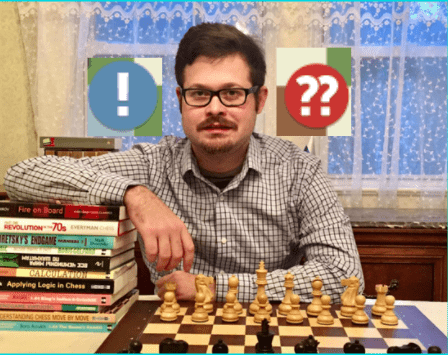
The Finest Games I've Lost: Ep. 2 (With Grand Prix Analysis)
You're up against a player 200, 300, 400 points higher than you. A tussle, a hussle, and after a stroke of fate, somehow you are on top. You are winning. Your heart is beating fast and you may start to think about what you will do after the round. You may be in the last round of a cash-prize tournament; you start to daydream about how you'll spend your winnings. A gift for your girlfriend, a trinket for your husband, flowers for your mother, who knows?
In your excitement, you want to run out of the tournament hall and tell your friends you're about to crush a GM (of course, you don't because talking about an ongoing game is prohibited by FIDE rules). You want to start writing a list of all the things you'll buy with your newly acquired prize (of course, you don't because taking notes is prohibited by FIDE rules).
 It is in these moments where many players lose their psychological balance, their objectivity, and make decisions they would find unthinkable under normal circumstances. In this series, I hope to assure the chess community that this phenomenon exists for all players, from beginners to the very top of the ladder, as you shall see in two examples. By studying examples and identifying "trends" (is the game going your way or your opponent's?) you can better identify your psychological state in the moment—thus slowing yourself down in the most critical moments.
It is in these moments where many players lose their psychological balance, their objectivity, and make decisions they would find unthinkable under normal circumstances. In this series, I hope to assure the chess community that this phenomenon exists for all players, from beginners to the very top of the ladder, as you shall see in two examples. By studying examples and identifying "trends" (is the game going your way or your opponent's?) you can better identify your psychological state in the moment—thus slowing yourself down in the most critical moments.
The following game between Esipenko and Nakamura was played yesterday. Esipenko, with the white pieces, needed a win to qualify for the Grand Prix semifinals—even a draw was unacceptable—thus setting the stage for a game heavily influenced by nerves. He outplayed Nakamura in brilliant fashion but failed to win at every turn, even when given multiple chances.
Is he a bad player? Did he forget how to win? Of course not. The following game can be explained by (a) a high-pressure situation and (b) an inability to control one's nerves in critical moments.
Although Esipenko did not lose in the above game (which is the theme of this blog series), the number of times he missed wins should be instructive. Moreover, this draw disqualified him from moving onto the semifinals, so it must have felt like a loss to him personally, especially because if he won he would have knocked Nakamura out of the semifinals.
One of the very hardest things, when a player is in full control, is to commit to a plan or idea. With a pleasant position, one does not want to take any risk rather than dive into complications. However, inaction is always an action, and sometimes it can backfire dreadfully. In the following game, after missing a direct win, the elite Russian player Fedoseev even went on to lose. You will also notice that he, just like Esipenko in the above game, made a noncommital Re1 move (almost identical) rather than going for a concrete and more complicated—yet winning—variation.
Rather than sit here and wax eloquent about how these grandmasters make mistakes, of course, I am going to share a game of my own. After all, cracking under pressure is a very human phenomenon and even the strongest in the world are capable of succumbing. The following game was played a while ago and it would have been one of my very earliest wins against a master. After the win slipped, I did not want to accept such a tragic turn of fate, and instead of looking for a draw I fell for an elementary tactic and resigned immediately.
Can you relate to such a game? Did this help you?
Leave a comment below.
Hit "Follow" if you'd like to be notified when I publish, and thanks for reading!
